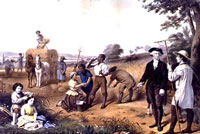Over My Shoulder #20: Damon W. Root (2006), review of David W. Southern’s The Progressive Era and Race
You know the rules; here’s the quote. I’ve mentioned before some of the reasons that I refuse to call myself a Progressive,
and why I loathe the current vogue for the term on the Left. I alluded to some of the historical reasons for it but didn’t actually spell the details out at the time. Fortunately, while I was riding to work on the bus a couple days ago I found out that a book review from this month’s issue of Reason said just what I wanted to say, at least as far as the topic of race is concerned. (There are some analogous points to be made about the experiences of women, workers, immigrants, and psychiatric patients during the same dark, violent era. But the book under review deals specifically with the relationship between the Progressive movement and the triumph of Jim Crow in its most brutal incarnation.) So, thanks to Damon W. Root and his review of David W. Southern’s The Progressive Era and Race, here’s a good precis of how I learned to start worrying and loathe Progressivism:
The Progressive movement swept America from roughly the early 1890s through the early 1920s, producing a broad popular consensus that government should be the primary agent of social change. To that end, legions of idealistic young crusaders, operating at the local, state, and federal levels, seized and wielded sweeping new powers and enacted a mountain of new legislation, including minimum wage and maximum hour laws, antitrust statutes, restrictions on the sale and consumption of alcohol, appropriations for hundreds of miles of roads and highways, assistance to new immigrants and the poor, women’s suffrage, and electoral reform, among much else.
Today many on the liberal left would like to revive that movement and its aura of social justice. Journalist Bill Moyers, speaking at a conference sponsored by the left-wing Campaign for America’s Future, described Progressivism as
one of the country’s great traditions.Progressives, he told the crowd,exalted and extended the original American Revolution. They spelled out new terms of partnership between the people and their rulers. And they kindled a flame that lit some of the most prosperous decades in modern history.Yet the Progressive Era was also a time of vicious, state-sponsored racism. In fact, from the standpoint of African-American history, the Progressive Era qualifies as arguably the single worst period since Emancipation. The wholesale disfranchisement of Southern black voters occurred during these years, as did the rise and triumph of Jim Crow. Furthermore, as the Westminster College historian David W. Southern notes in his recent book, The Progressive Era and Race: Reform and Reaction, 1900–1917, the very worst of it–disfranchisement, segregation, race baiting, lynching–
went hand-in-hand with the most advanced forms of southern progressivism.Racism was the norm, not the exception, among the very crusaders romanticized by today’s activist left.At the heart of Southern’s flawed but useful study is a deceptively simple question: How did reformers infused with lofty ideals embrace such abominable bigotry? His answer begins with the race-based pseudoscience that dominated educated opinion at the turn of the 20th century.
At college,Southern notes,budding progressives not only read exposés of capitalistic barons and attacks on laissez-faire economics by muckraking journalists, they also read racist tracts that drew on the latest anthropology, biology, psychology, sociology, eugenics, and medical science.Popular titles included Charles Carroll’s The Negro a Beast (1900) and R.W. Shufeldt’s The Negro, a Menace to American Civilization (1907). One bestseller, Madison Grant’s The Passing of the Great Race (1916), discussed the concept of
race suicide,the theory that inferior races were out-breeding their betters. President Theodore Roosevelt was one of many Progressives captivated by this notion: He opposed voting rights for African-American men, which were guaranteed by the 15th amendment, on the grounds that the black race was still in its adolescence.Such thinking, which emphasized
expertopinion and advocated sweeping governmental power, fit perfectly within the Progressive worldview, which favored a large, active government that engaged in technocratic, paternalistic planning. As for reconciling white supremacy with egalitarian democracy, keep in mind that when a racist Progressive championedthe working man,the common man,orthe people,he typically prefixed the silent adjective white.For a good illustration, consider Carter Glass of Virginia. Glass was a Progressive state and U.S. senator and, as chairman of the House Committee on Banking and Currency, one of the major architects of the Federal Reserve Act of 1913. He was also an enthusiastic supporter of his state’s massive effort to disfranchise black voters.
Discrimination! Why that is exactly what we propose,he declared to one journalist.To remove every negro voter who can be gotten rid of, legally, without materially impairing the numerical strength of the white electorate.Then there was political scientist John R. Commons, an adviser to the Progressive Wisconsin governor and senator Robert M. LaFollette and a member of Theodore Roosevelt’s Immigration Commission. Commons, the author of Races and Immigrants in America (1907), criticized immigration on both protectionist grounds (he believed immigrants depressed wages and weakened labor unions) and racist ones (he wrote that the so-called tropical races were
indolent and fickle).Woodrow Wilson, whose Progressive presidential legacy includes the Federal Reserve System, a federal loan program for farmers, and an eight-hour workday for railroad employees, segregated the federal bureaucracy in Washington, D.C.
I have recently spent several days in Washington,the black leader Booker T. Washington wrote during Wilson’s first term,and I have never seen the colored people so discouraged and bitter as they are at the present time.Perhaps the most notorious figure of the era was Benjamin
PitchforkTillman, a leading Southern Progressive and inveterate white supremacist. As senator from South Carolina from 1895 to 1918, Tillman stumped forFree Silver,the economic panacea of the agrarian populist (and future secretary of state) William Jennings Bryan, whom Tillman repeatedly supported for president.PitchforkTillman favored such Progressive staples as antitrust laws, railroad regulations, and public education, but felt the latter was fit only for whites.When you educate a negro,he brayed,you educate a candidate for the penitentiary or spoil a good field hand.— Damon W. Root, Reason (May 2006): When Bigots Become Reformers: The Progressive Era’s shameful record on race, pp. 60–61.
As Southern thoroughly documents,
Root notes a bit further down, these examples just begin to scratch the surface. Progressivism was infested with the most repugnant strains of racism.
That was no accident. And it wasn’t just some minor blight on a basically good movement. It was part and parcel of Progressivism, its pseudodemocratic anti-radicalism, its sustained assault on autonomous, state-free mutual aid assocations and labor unions, its contemptuous pity for the downtrodden, and its embrace of the government-backed Expert as the natural person to solve their problems for them (whether they liked it or not). It’s long past time for Progressivism to be left in the dustbin of history, for we as a society, and the left as a movement, to progress beyond that kind of adolescent power trip to a theory and practice based on respect, mutuality, solidarity, and freedom. Dump the bosses of your back.
 The
The 
